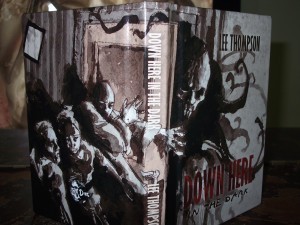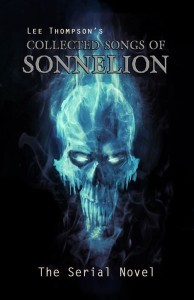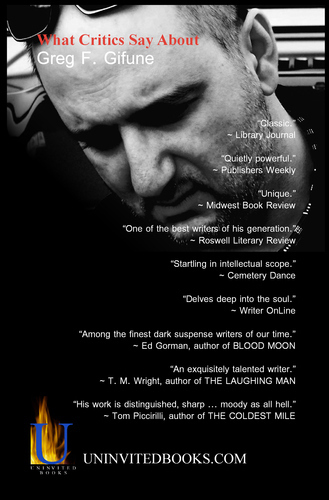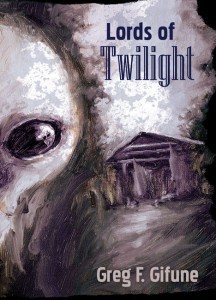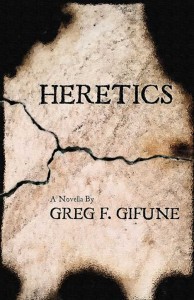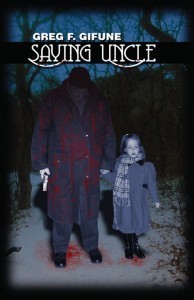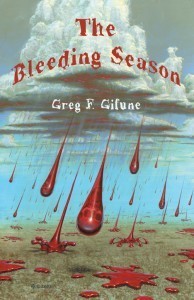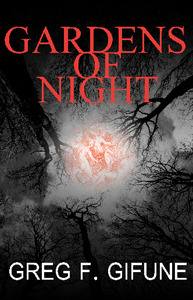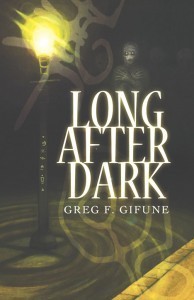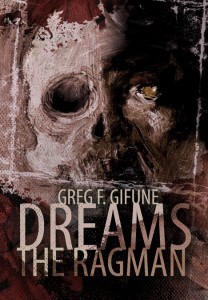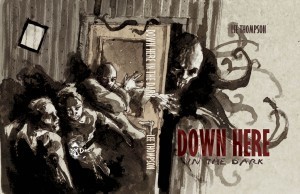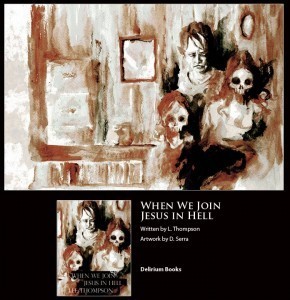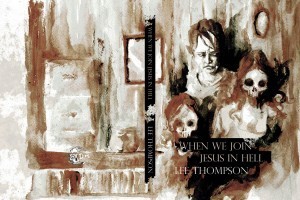Lee Thompson's Blog, page 22
April 14, 2012
Down Here in the Dark (Hardcover author copies)
Got my author copies of DOWN HERE IN THE DARK today. Awesome. I love the cover Dani Serra came up with. Hardcovers are sold out but you can still snag it in digital for Kindle, Nook, iPad, Sony, etc.
This is the sequel to IRON BUTTERFLIES RUST and an important piece of the Division mythos. Thanks to everybody who has already purchased and/or reviewed it!
April 13, 2012
Chapter 8 of Sonnelion and other gems
Red Piccirilli has known madness and magic. They’re in his blood and bound to his soul. But when his family moves to the town of Division, Pennsylvania, his father grows distant, his mother troubled, and a murderer roams the countryside.
He searches for answers while battling his own darkness, rage and despair, but corpses whisper secrets only the dead can discover.
Chapter 8 of THE COLLECTED SONGS OF SONNELION will go live today on my publisher’s website. Dig into it. Spread the word. Let me know what you think whether you read it here or here. 
Also heard this great podcast interview where K. Allen Wood and Mercedes Yardley from Shock Totem magazine bring the entertainment. Give it a listen and thanks again to Ken for the mention!
And I interviewed Greg F. Gifune, one of the best Dark Fiction writers out there. Give it a read. Tons of insights for new and up-and-coming writers to add to their toolbox.
Also saw the cover spread for my Thunderstorm Books release IMMERSION which will be out next month in signed/limited hardcover, paperback, and digital. The sig sheets for the hardcover are on the way and should be there when I get home! Neat.
My local paper The Tuscola County Advertiser sent me a query about an interview, too. Excellent. I love interviews. Should be good fun. I’ll take some pics to post on here when I have a copy of it!
April 11, 2012
Greg F. Gifune interview
Called "One of the best writers of his generation" by both the Roswell Literary Review and author Brian Keene, and praised by masters like author Ed Gorman, Greg F. Gifune is the author of numerous short stories, several novels and two short story collections (HERETICS and DOWN TO SLEEP). His work has been published all over the world, consistently praised by readers and critics alike, received starred reviews in Publishers Weekly, Library Journal and The Midwest Book Review (among others) and has recently garnered interest from Hollywood. His novels include CHILDREN OF CHAOS, DOMINION, THE BLEEDING SEASON, DEEP NIGHT, BLOOD IN ELECTRIC BLUE, SAYING UNCLE, A VIEW FROM THE LAKE, NIGHT WORK, DRAGO DESCENDING, CATCHING HELL, JUDAS GOAT, LONG AFTER DARK and KINGDOM OF SHADOWS.
In addition to working as a full-time author, he also serves as Editor at Darkfuse Publications. Greg resides in Massachusetts with his wife Carol and a bevy of cats. He can be reached online at: gfgauthor@verizon.net or through his official web site.
He's one of my favorite writers and I'm honored he's taken the time to answer some questions. Feel free to leave comments and share the interview, people!
Me: Congrats on your Delirium novella LORDS OF TWILIGHT breaking the top 100 on Amazon! What's the story about and what significance does it hold for you?
Greg: Thanks. The novella is about a former high school teacher who has lost everything due to accusations of sexual misconduct made against him by a female student. His marriage is in ruins, his career is over and he's on the verge of a nervous breakdown, so he flees to a place where no one knows him, a rural town in northern Maine. In an attempt to reset and put his life back together, he buys a small house in the middle of nowhere and settles down for the winter with his puppy Vince. As the story unfolds, we see a desperately lonely man trying to hold onto whatever scraps of his life and sanity remain, while strange, otherworldly things begin happening in town. Soon, he realizes these events may somehow be connected to his breakdown. While on the surface it's an alien invasion/abduction tale, that's also a metaphor for what's happening to him, what he's allowed to happen to himself, those things in his life that have invaded and dominated him and who (or what) may be pulling the strings.
Me: I imagine things were quite a bit different when you started writing. What were your beginning years like?
Greg: They were different. My early years trying to break in were very difficult. I went nearly five years with nothing but rejections before I was able to break in and get published. Once I sold my first short story though, things took off. It was a struggle early on, and I'm glad it was, it's supposed to be that way and it ultimately made me a much better writer. I kept working hard as I could to continue to learn and hone my craft, and it paid off. I was also fortunate to come up during the old zine days in the late 90s and early 2000s, which were great. There were so many cool little magazines out there looking for new talent and good work, most run by artists and people who really cared about what they were doing. There was a wonderful atmosphere then. All of us were in it together and trying to make something original and good and new. Sometimes we were paid in cash, sometimes in copies, sometimes both. It was a fun time and an atmosphere that really helped develop a lot of writers into professionals. It was like this great little minor league where we all got our start before being called up to the majors. Most of the name writers in the genre today (if they've been established awhile) came up during the zine years. I feel bad for writers starting out today that don't have the zine culture to work in because it was pretty special.
Me: Very cool. How the hell do you release so much work?
Greg: I can be fairly prolific, but remember, I've also been doing this a long time. I've been a professional, published author for nearly fifteen years now, and I have a lot of work to show for it. I go through periods where I write like a demon, produce a lot of work and am very productive. Then I have periods where it's like pulling teeth, where I sit at the keyboard for hours and hours and struggle to write a single paragraph. But I try to produce work regularly because, one, I have a mortgage, and two if I don't and I let it stay bottled up in me the results are not good. I'm tortured enough, I need to get these things out, and writing is how I do that.
Me: I understand that. You have a distinctive style—dark, brooding, poetic—that I, and a lot of other readers, love. Did you find your voice there from the beginning and just have to develop it through attentive practice? Or did it change drastically somewhere along the way?
Greg: Thanks. A writer's voice comes from the deepest parts of who they are. Often it comes from the darkest parts, the purest. Not to say it can't come from a happy place too, it does—but most serious fiction is dark, so you need to be able to mine that effectively (and frankly, there has to be something to mine). Writers should run into the fire, not away from it, toward the pain and darkness, not away from it. There's no other way to come through it. You can go around it but then what the hell's the point? If you're not willing to bleed when you have to, to get down there into the crazy then why be an artist? It's a balancing act, what we do, between sanity and madness, and that's where you'll find your real voice. I always had that voice, it was always present on some level, because when finding your voice, if it's genuine and comes from a place of raw, stripped down honesty, then you really don't create it per se, you're simply digging down to where it already is and uncovering it. What I needed to do was learn how to use that voice correctly and effectively, and also how to develop it, hone it, sharpen and maximize it. It goes back to craft. The key, to me, was not being wholly conscious of it. In a sense, it's instinctual, and you shouldn't think about it. Be aware of it and try to hone it, but let it happen, let it speak. In-other-words don't try to write in your 'voice.' Listen instead, and let your voice speak to you. Trust it. Leave it to its own devices (more or less), and let it do what it needs to do to gather strength and confidence and that will manifest in the writing.
Me: I still have to catch up on some of your work (I know, shameful) but of the majority I've read I'd suggest these three to new readers who want to give your work a try: SAYING UNCLE, THE BLEEDING SEASON, and LONG AFTER DARK. Do you have favorites? Which books have been pivotal in your growth as a writer?
Greg: Yeah you need to correct that ASAP, man. Go ahead. I'll wait (laughs). You know, I get asked this a lot and I really don't have favorites. THE BLEEDING SEASON is one I have to point to because it was the novel that really broke through for me, and in the years since it was first published it's already become considered by many to be a classic in the genre. That novel means a lot to me, and I think if a reader wanted to get the essence of my writing, THE BLEEDING SEASON would probably be a good place to start. But the others you mentioned, particularly SAYING UNCLE (which is really more a family drama than a genre piece), was very personal to me (as all my work is) and has a special place in my heart as well. LONG AFTER DARK is a novel I'm very proud of, and again, I think it captures the essence of what I do well. In terms of my growth as a writer, I can't point to one or two. They've all helped that and they all have meaning to me. If they don't, there's no point in writing them. That's what it's about for an artist, as you know; it's a process that never really ends. We're always growing, always learning, always striving to be better and go deeper. It's like climbing a mountain and knowing you'll never reach its summit because the summit doesn't exist. There is no end of the road. But the struggle to get there is what makes you better and brings out your best work. Just because Shangri-La may not exist doesn't mean we shouldn't keep looking for it, because maybe that's exactly where it does exist, in the striving.
Me: Agreed. The striving is the gold. I've just started selling work and find it difficult to keep up with emails from people. How do you manage it?
Greg: You saw how long it took me to find the time to do this interview. Which again, I apologize for, but that'll give you an idea. Between email messages, regular mail (people do actually send letters these days now and then, or books they want me to sign or that kind of thing), and Facebook messages, it's hard to keep up sometimes, but I do my best to start each day answering as many as I can and I usually hit them again right before I wrap up for the day. And I remind myself daily that there are worse things than to be in demand. There are countless writers who would love to have such problems, so I don't bitch about it. It's actually very nice, but it can be overwhelming sometimes in that if I don't keep up with it I'd be in trouble. Now add to that my new gig as Editor at Darkfuse Publications, and it's completely off the charts.
Me: Thanks, Greg. GARDENS OF NIGHT was in my top five for 2011. I was stoked to hear it's part of a trilogy. Did you realize it after writing the first book? Were they written back-to-back? What's special about the trilogy and what do you explore in these books?
Greg: Thanks, GARDENS is a novel I'm very proud of, and I'm also proud that it helped launch such an important and exciting new publishing company, UNINVITED BOOKS. Rob Dunbar is doing some amazing things there. Check it out (www.uninvitedbooks.com) and pick up a few of their titles—great stuff. The way the trilogy came about was I wrote a short story years ago called SMOKE. It was published in a few magazines and then appeared in my short story collection DOWN TO SLEEP (Delirium Books). I knew then it would not only one day be a novel, but a novel in a trilogy, because I had the overall vision at once. I had always planned to write SMOKE as a novel first, but once I sat down and went over the entire project, I realized BLOOD IN ELECTRIC BLUE needed to come first, followed by GARDENS OF NIGHT (they needed to be written in that order but don't necessarily need to be read in that order, although that is ideal). So ironically, the story that gave birth to the trilogy concept and those two novels has turned out to be the last one that'll be written. I still haven't finished it, but I'm hoping to relatively soon. It's now titled SMOKE IN CRIMSON, and like the other two novels, it can be read as a stand-alone novel or as part of the trilogy. All three are designed to work as both lone novels and part of a bigger picture. The concept behind it had to do with exploring some of my own demons and working through some things through the use of mythology. I wanted to use mythical female characters specifically, because it tied into the overall theme(s) of the novel(s) and allowed me to try some things I hadn't before, and to try some things that—far as I know—hadn't been done before in relation to these mythological creatures and how they could (and should) relate to the human experience. In the end, the novels in the trilogy are about what it's like to be human, and ironically, how things that are so decidedly not human can shape that.
Me: I've sold five books to Delirium/Darkfuse in the last year and a half, and Shane Ryan Staley has been awesome to work with—insightful, humorous, straightforward, knowledgeable, and passionate. How long have you been working with Shane Ryan Staley? What are the ingredients for a successful working relationship (I know it seems like a dumb question but I'm pretty convinced that it'll help newer writers who may be ignorant)
Greg: Shane and I go way back, little over fifteen years. We both came up as writers and editors right around the same time. We were both part of that zine culture and crossed paths a few times, sometimes as writers working side-by-side in magazines or anthologies, sometimes with one of us acting as editor and the other as the writer. Pretty early on we both liked and respected each other as writers and editors. Love Shane or hate him, he's honest—often to a fault—and that's a rare quality in this business. I've always been impressed with his work ethic and the way he approaches things and sees the business. Shane is very no-nonsense, and I'm very similar when it comes to business. Nothing's personal with him (or me), when it comes to business, and some people fail to always understand that, but that's really how it is. Yes, we're artists, but this is also a business, and in order to survive and thrive, sometimes tough decisions and unpopular stances need to be made. He's always done that (with a greater good in mind) and he's always been ahead of the curve in this business, and I respect that. Again, that aspect is business. I don't have to like every business decision he makes as a friend, but when warranted (which is almost always the case), I have to respect it from a business standpoint. We shared a lot of the same views from the beginning but were also able to discuss our differences as well without any difficulty. We've had our share of disagreements, but we've always been able to do it respectfully and to, again, keep it business. This isn't a hobby or some ego thing with Shane, he was a pro from the start and wanted to make a mark—a difference—he wanted to do something special that hadn't been done before, and while he rarely took himself seriously, like me, he took the work very seriously. When he started Delirium Books I took notice and submitted some things. I remember he rejected the first series of stories I sent him (in the hopes of landing a short story collection), when he wrote back to me simply, 'I see nothing here I'd be interested in publishing.' Vintage Shane (laughs).
I kept trying and eventually sold another series of stories to him, along with the novella HERETICS as the anchor of the collection, and our working relationship took off from there. Heretics got amazing reviews and brought a lot of attention and prestige to me and to Delirium, and when I followed it up with THE BLEEDING SEASON the same happened but on a larger scale, and sort of set the stage for what followed with my work. Much like I did when I was Editor-in-Chief at Thievin' Kitty Publications and later as Associate Editor at Delirium and now as Editor at Darkfuse, Shane built a reputation as someone who took chances on up-and-coming authors, and really got behind them and helped build their careers. This was unheard of back then, particularly in the independent press. It's often forgotten (or not even known) by many today, but back in the day he really opened the door for numerous new and up-and-coming writers that otherwise would've never been given the chance. That's just a fact.
Over time Shane and I became friends as well, but we've always both been very strict about keeping our friendship and business relationships separate. Anyone who truly knows either one of us knows this. We have a solid relationship as professionals. Although I've worked, and continue to work regularly with numerous publishers (and am always open to that), my main home is Delirium because I've built a career there and also been part of helping Shane build what I believe is the best genre publishing house there is. In terms of what builds a good relationship, it's tough to say because it's rare to find a relationship between an author and publisher like we have, which is one of the reasons I'm grateful for it. It should come as no surprise to anyone who's been in this business more than ten minutes that writers tend to take the pipe in most cases, so trust me, I've had my share of horrendous experiences with publishers, so when I find publishers that treat me well and treat me fairly, I stick with them and I'm loyal to them. That can be tricky sometimes, because writers are like mercenaries, hired guns. We have a certain skill and if you want what we can do, you have to pay us (except for this wildly disturbing trend of writers giving their work away for free), and we have to deliver. A good publisher understands this and will work toward creating the best possible situation for everyone. A lesser publisher will treat the writer strictly like a product, which of course we are, but we all like to be seen as something beyond that as well.
I think since Shane is a writer himself, it helps a lot. He understands what it is to be writer as well, and he's sympathetic to it. In most cases it boils down to patience, mutual respect and a good working relationship, which is actually very difficult to find in this business. And that's the other big thing: understand (again) that this is a business and you'll go a lot farther.
Me: Excellent advice. Thank you. What's next for Greg F. Gifune?
Greg: I have a lot of projects going on, working on some novels and novellas, my first graphic novel project (with amazing artist and one of my oldest friends, Greg Chopoorian), which I'm very excited about, and some other things I can't talk about yet. Also keeping busy as Editor at DarkFuse, putting together a lineup of authors I think a lot of people are going to be very excited about. I'm assembling a lineup that consists of outstanding new writers and more established veterans, and so far the fiction is absolutely amazing. I really think it's going to be something special. When you see the Darkfuse brand (much like Delirium), you'll know we're talking quality.
Me: If you could only offer three pieces of advice to writers, what would they be?
Greg: 1. Learn the craft. Worry about that, rather than getting published and trying to be some pseudo celebrity, and be the best writer you can be instead. That's why you're here, right? If not then my advice is to fuck off and go do something else. The business has enough posers and pains-in-the-ass clogging it up as it is. If you're real, and this is real to you, then focus on always learning and striving to produce your best work and the rest will come. 2. Learn the business, work hard and stay clear of organizations and circle jerks and mutual admiration societies and all that bullshit and smoke and mirrors and focus on what matters, the work. 3. Don't self-publish unless you're already established (and even then, be careful), and don't devalue your work (or literature in general) by giving it away or under-pricing it to the point where you're just a discount item.
Me: Great advice. Your characters are always complex and well-rounded. Do you have a process for developing them? Or do they arrive to the story close to fully formed?
Greg: In short, I treat them as real people (rather than 'characters') and I do have a process for developing them. They arrive fully formed. The characters are everything to me. They're usually a compilation of people I know or have known, or something similar. I create files and backgrounds on all of them (most of which seldom makes it to the finished product but allows me to know them fully in any situation I place them in or struggle I give them). My stories are generally born from the characters, not the other way around.
Me: I hear that. What's your favorite part in working on a new book? Why?
Greg: Finishing it and being free of it, being able to (hopefully) be pleased with and proud of what I've accomplished. I'm in the Dorothy Parker camp. Hate writing, love having written.
Me: Lol. Anything I should have asked and didn't?
Greg: Not that I can think of but I'll be happy to answer anything else.
Thanks for taking the time, Greg. You're a rocker. I'll send you sappy fan mail soon. Hehe.
And there you have it. Go grab one of his novels and see why he's so respected.
April 5, 2012
Chapter 7 up on Darkfuse’s website
Red Piccirilli has known madness and magic. They’re in his blood and bound to his soul. But when his family moves to the town of Division, Pennsylvania, his father grows distant, his mother troubled, and a murderer roams the countryside.
He searches for answers while battling his own darkness, rage and despair, but corpses whisper secrets only the dead can discover.
Chapter 7 of COLLECTED SONGS OF SONNELION will be live soon on Darkfuse’s website. Thanks to everybody who has followed along and shared!
If you have trouble reading older chapters on Darkfuse’s website, you can also read them on Issuu.
Chapter 7 up on Darkfuse's website
Red Piccirilli has known madness and magic. They're in his blood and bound to his soul. But when his family moves to the town of Division, Pennsylvania, his father grows distant, his mother troubled, and a murderer roams the countryside.
He searches for answers while battling his own darkness, rage and despair, but corpses whisper secrets only the dead can discover.
Chapter 7 of COLLECTED SONGS OF SONNELION will be live soon on Darkfuse's website. Thanks to everybody who has followed along and shared!
If you have trouble reading older chapters on Darkfuse's website, you can also read them on Issuu.
March 29, 2012
Thank you!
A big thanks to those who came to the live event and asked questions, participated in the polls, and won some great prizes! You all made it a wonderful night! And thanks to my publisher Shane Ryan Staley and his marketing director Dave Thomas for putting the event together!
You can read the transcript here.
Hopefully we'll be able to do another one later this year! It's such a reminder of how much I'll enjoy taking paperbacks to sell and sign at book fairs later this year.
And for those following along with my serial novel THE COLLECTED SONGS OF SONNELION the first six chapters are now up here.
If you have a problem reading the earlier chapters on Darkfuse's website you can also read them on Issuu.
March 27, 2012
Review on Famous Monsters of Filmland
Got a new review of Down Here in the Dark (the sequel to Iron Butterflies Rust) on Famous Monsters of Filmland. Thanks to Peter Schwotzer!
Also just got news that IMMERSION is nearing completion from Thunderstorm Books! Have to turn in the dedication, acknowledgement, jacket copy when I get home tonight. Sweet.
And don't miss out on the live event this Thursday at 9 pm EST. Lots of great prizes and it's going to be good fun!
March 26, 2012
Cover for WHEN WE JOIN JESUS IN HELL
Here is the cover for a book coming out from Delirium Book's later this year. It's a savage and heartbreaking story and a nod to my hero Tom Piccirilli (who was also kind enough to read it pre-publication!) Wonderful artwork again by the super talented Dani Serra.
Also a new post on Darkfuse about my Live Event and the serial novel COLLECTED SONGS OF SONNELION. I'd mentioned in an interview with Blu Gilliand on October Country recently that I write toward pivotal moments and we just hit one in the fifth chapter of the serial. Feel free to give it a read and spread the word.
My buddy K. E. Bergdoll just did a review of THE STEEL SERAGLIO by Mike Carey, Linda Carey & Louise Carey from ChiZine Publications, and it's live on The Crow's Caw now. Check it out.
Sometime this week I'll be finalizing the narrator's audio tracks for the audio book version of Nursery Rhymes 4 Dead Children (my first novel that was released last year.) Exciting.
I hope everybody is well!
March 22, 2012
Chapter Five: Collected Songs of Sonnelion
All right! The first five chapters of my Division novel THE COLLECTED SONGS OF SONNELION are up on Darkfuse's website. Give them a read, let me know what you think, and spread the word to anybody who enjoys well-written dark fiction.
Also had an interview about the Division Mythos and Publishing go live on Blu Gilliand's October Country. It's a good primer for what will be coming up next Thursday night on the Live Event. They'll be giving away some of my hardcovers and a 24 bundle of Delirium novellas by fantastic writers like Cate Gardner, Brian Hodge, Greg F. Gifune, and Jeffrey Thomas.
And my latest novel THE DAMPNESS OF MOURNING is now available in all digital formats. It ties in directly to all the other Division stuff.
Darkfuse is also having a huge sale and I wish I had a bunch of money right now because I'd buy most of these.
Thanks to everyone who has been buying the work, reviewing it, and spreading the word! It's going to be an extremely exciting year!
March 19, 2012
Interviewed about Publishing and Division Mythos on October Country
In a short publishing history that dates back only to 2010, Lee Thompson has amassed a large collection of acceptance letters and heaps of praise from peers like Tom Piccirilli and Brian Keene. He's also laid the foundation for a massive mythology all his own, the Division Mythos, a huge, expansive story arc that remains tightly focused on character. It's quite an ambitious undertaking for a "new" writer (Thompson may have only been publishing for two years, but he's written for far longer than that, collecting "enough rejections to break an elephant's back"), but Thompson is undaunted. The author was kind enough to take a break from world-building to share a few words with October Country…
Go here to read the interview!
Thanks to any who take the time and those who share!

